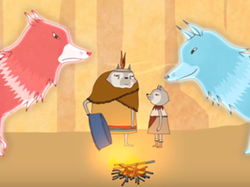 I recently saw a video that Sharon Salzberg produced on How Mindfulness Empowers Us. She shares a Native American folktale, about two wolves. An elder says to a child, “I have two wolves fighting in my heart. One wolf is fearful, vengeful and angry, and the other is compassionate, kind and gentle." The child asks, “which wolf will win the fight?” And the elder responds, "The one I feed.” The powerful message intended in this story is the fact that you choose how you want to respond, behave, and engage with others. No one makes you feel a certain way; you decide what voices you listen to, how you feel, and how you want to respond to the world around you. However, there was something that didn’t sit well with me. The way the “bad wolf” was dismissed didn’t seem to be the right approach. From my experience working with many executives, I’m well aware of the impact negative self-talk. When you continue to pay attention to the negative voice in you head, it grows and becomes more destructive. As my colleague Anne Suh says, “What we practice grows stronger.” And, I have found the reverse to be true as well. The more you try to ignore the negative talk or “gremlin” (as it’s often called), the more it grows and the louder it becomes. So, if you listen to the gremlin, it grows and if you ignore it, it continues to grow as well…. what is one supposed to do? Here’s a strategy that helps many of my clients deal with their gremlins: Name it. Thank it. Tame It.
What I like about this approach is that I’m not trying to suppress the negative thoughts, I recognize, accept, and move on. The more you practice this technique the more you become in charge. During our last Book Club discussion on the book, “You are Not Your Brain,” we explored the way author Jeffrey Schwartz differentiates between the mind and the brain. He explains in the book, the “brain decides what will grab you [and the] mind can decide what to do when grabbed.” Schwartz came up with a concept of “Free Won’t” instead of Free Will. In his research, he has documented that there is a half of a second from the time your brain decides to take an action to the time your mind is conscious of that thought. And then there is another half of a second before your pre-frontal cortex (higher brain functioning) kicks in. Although this may sound daunting of how quickly you react from a thought or stimulus, the good news is that if you simply take two deep breaths before reacting, you can buy yourself some time to react in a more rational manner. Victor Frankl, a psychologist and Holocaust survivor is often quoted to have said, “Between stimulus and response there is a space. In that space is our power to choose our response. In our response lies our growth and our freedom.” He proclaims that even in the midst of the most horrifying human conditions (referring to the concentration camps), “Everything can be taken from a man but one thing: the last of the human freedoms—to choose one’s attitude in any given set of circumstances, to choose one’s own way.” So, I challenge you, next time you become aware of your gremlin telling you you’re not good enough, smart enough, (fill in the blank) enough… first take a breath and then get to know this little voice. Name it, Thank it, Tame it.
1 Comment
6/1/2018 05:19:47 pm
Laura, you make some truly useful distinctions here for those of us who would like to respond responsibly to perceived threats and negative interpretations.
Reply
Your comment will be posted after it is approved.
Leave a Reply. |
AuthorLaura Mendelow |
|
|
©2020. All Rights Reserved. Mendelow Consulting Group, LLC.

